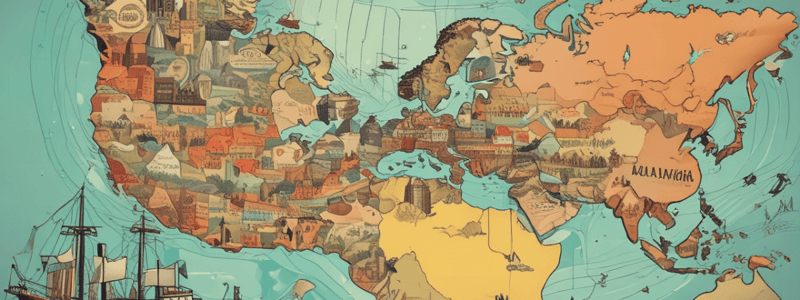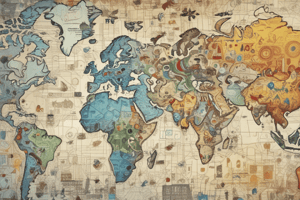Podcast
Questions and Answers
What is the ultimate test of any political system?
What is the ultimate test of any political system?
its ability to hold a society together
What must a multinational enterprise's management do to succeed in countries with different political and legal environments?
What must a multinational enterprise's management do to succeed in countries with different political and legal environments?
carefully analyze the fit between its corporate policies and the political and legal conditions of each particular nation in which it operates
What is the significance of Individualism versus Collectivism in profiling political systems?
What is the significance of Individualism versus Collectivism in profiling political systems?
it helps to highlight the similarities and differences among political systems according to the primacy of individual rights versus the larger community
What do political systems integrate, according to the definition?
What do political systems integrate, according to the definition?
Why do multinational enterprises face risks when investing and operating internationally?
Why do multinational enterprises face risks when investing and operating internationally?
What influences the extent to which government intervenes in business and the way business is conducted?
What influences the extent to which government intervenes in business and the way business is conducted?
What is the defining characteristic of democracy?
What is the defining characteristic of democracy?
How do decentralized democracies, such as Canada and the US, affect companies?
How do decentralized democracies, such as Canada and the US, affect companies?
What are the three categories used to rate countries based on their political rights and civil liberties?
What are the three categories used to rate countries based on their political rights and civil liberties?
How does a totalitarian government maintain power?
How does a totalitarian government maintain power?
What is the key difference between theocratic totalitarianism and secular totalitarianism?
What is the key difference between theocratic totalitarianism and secular totalitarianism?
What is the role of citizens in a totalitarian system?
What is the role of citizens in a totalitarian system?
What is a mixed legal system, and where are most countries with such systems found?
What is a mixed legal system, and where are most countries with such systems found?
How do national laws and regulations affect business operations?
How do national laws and regulations affect business operations?
What is the relationship between a country's per capita income and its tendency to regulate business?
What is the relationship between a country's per capita income and its tendency to regulate business?
How do legal contingencies affect an international competitor's strategic plans?
How do legal contingencies affect an international competitor's strategic plans?
What is country-of-origin labeling, and what is its purpose?
What is country-of-origin labeling, and what is its purpose?
Why do countries with easier business startup processes tend to have fewer regulations?
Why do countries with easier business startup processes tend to have fewer regulations?
What national security concern shapes country-of-origin regulations?
What national security concern shapes country-of-origin regulations?
What aspect of marketing practices do national laws determine?
What aspect of marketing practices do national laws determine?
Why must products often be customized in foreign markets?
Why must products often be customized in foreign markets?
What determines which law applies and where litigation occurs in international business?
What determines which law applies and where litigation occurs in international business?
What type of assets do intellectual property rights consist of?
What type of assets do intellectual property rights consist of?
Why are intellectual property rights complicated to specify, regulate, and enforce?
Why are intellectual property rights complicated to specify, regulate, and enforce?
What is the primary challenge in enforcing International Property Rights (IPRs) worldwide?
What is the primary challenge in enforcing International Property Rights (IPRs) worldwide?
What is a key distinction between legal and ethical behavior in business?
What is a key distinction between legal and ethical behavior in business?
What is a significant difficulty faced by countries transitioning from a totalitarian to a democratic political system?
What is a significant difficulty faced by countries transitioning from a totalitarian to a democratic political system?
What is a key consideration for companies operating internationally when assessing political risk?
What is a key consideration for companies operating internationally when assessing political risk?
Why are International Property Rights important for registered owners?
Why are International Property Rights important for registered owners?
What is a key challenge for companies operating in countries with underdeveloped legal systems?
What is a key challenge for companies operating in countries with underdeveloped legal systems?
Study Notes
Political Environment
- A political system refers to a complete set of institutions, political organizations, and interest groups, as well as the relationships among them, and the political norms and rules that govern their activities.
- A political system integrates various parts of a society into a functioning entity and influences the extent of government intervention in business and how business is conducted domestically and internationally.
Individualism vs. Collectivism
- Societies can be profiled according to the primacy of individual rights and roles versus those of the larger community.
- Contemporary democracies share characteristics such as freedom of opinion, expression, and information, as well as fair elections and an independent judiciary.
Democracy
- Decentralized democracies, like Canada and the US, may have different laws in different states or provinces.
- The defining characteristic of democracy is freedom, and measures of political rights and civil liberties can assess levels of freedom.
Totalitarianism
- Totalitarianism is a system in which citizens rarely participate in decision-making and governance, with power monopolized by a single agent, and opposition is not recognized or tolerated.
- Theocratic totalitarianism combines religious and political leadership, while secular totalitarianism relies on state authority.
Mixed Legal Systems
- Mixed legal systems emerge when two or more legal systems are used within a single country, such as the US, which combines common and civil law.
Legal Issues Facing International Companies
- Operational concerns include national laws and regulations affecting business startup, contracts, employee management, and business closure.
- Strategic concerns include product regulation, marketplace behavior, product safety and liability, legal jurisdiction, and intellectual property rights.
Intellectual Property Rights
- Intellectual property rights consist of ownership rights to intangible assets, such as copyrights, patents, and trademarks.
- Enforcement of intellectual property rights is difficult due to cross-cultural and cross-national differences, and the lack of a global registration system.
Studying That Suits You
Use AI to generate personalized quizzes and flashcards to suit your learning preferences.
Related Documents
Description
This quiz covers the dynamics of politics and laws in international business, including the risks that arise from changes in a country's political system. Learn about the challenges faced by multinational enterprises operating in countries with different political and legal environments.




